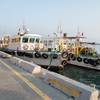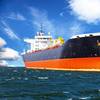The Prestige incident has been followed closely by IMO since events began to unfold some days ago. The IMO Secretariat established contact immediately with the authorities of Spain and with the Flag State authorities of the Bahamas. As in any situation such as this, the prime concerns of IMO have been for the safety of human life and the protection of the marine environment. Despite the adverse conditions, no human life has been lost in this incident and the search and rescue authorities of Spain deserve much credit for dealing with this matter promptly and effectively and in accordance with the provisions of IMO instruments, in particular the International Convention on Maritime Search and Rescue.
Once assurances concerning the safety of the ship's crew had been received, the focus of attention turned to the protection of the marine environment. The Spanish authorities were advised that any assistance which the Organization might be able to offer would be made available on their request.
Regulatory regime
The Prestige was subject to a comprehensive regime of safety and environmental regulations, including those of the main IMO Conventions, i.e. the Safety of Life at Sea Convention (SOLAS) and the International Convention for the Prevention of Pollution from Ships (MARPOL), to both of which the Flag State of the Bahamas is a Party.
IMO's main concern now is to establish, as quickly and as thoroughly as possible, exactly what went wrong in this case so that the effectiveness of the regulatory framework that IMO has put in place can be properly assessed and action taken, if need be, to rectify any weaknesses or deficiencies identified. Under the provisions of SOLAS and MARPOL, the Flag State Administration is required to conduct an investigation into serious casualties. The Flag State authorities of the Bahamas are therefore urged to expedite their investigation into the incident and provide IMO with their findings, conclusions and recommendations.
Phasing-out of single-hull tankers
The revised MARPOL Convention contains a timetable by which single-hull tankers will be phased-out in favor of double-hull ships. The Prestige was a single-hull tanker built in 1976, that is before the MARPOL Convention (which had been adopted in 1973) entered into force in 1982. In April 2001, the Parties to the MARPOL Convention agreed to accelerate the timetable for phasing out existing single-hull tankers in a revised regulation 13G of that Convention. According to the revised regulation, which entered force internationally in September 2002, single-hull tankers built in 1976 would be required to be scrapped by 2005.
Survey and inspection
In addition to their routine annual and other surveys, since 1995 all tankers and bulk carriers aged five years and over have been subject to a specially enhanced inspection programme which is intended to ensure that any deficiencies - such as corrosion or wear and tear resulting from age or neglect - are detected. Guidelines on enhanced surveys on tankers and bulk carriers are contained in IMO Assembly resolution A./744/(18), which was adopted in November 1993 and has been subsequently amended. In 1994 it was given mandatory status under the SOLAS Convention.
Places of refuge
In the aftermath of the incident involving the fully laden tanker Castor which, in December 2000, developed a structural problem in the Mediterranean Sea, IMO Secretary-General William O'Neil suggested that the time had come for the Organization to undertake, as a matter of priority, a global consideration of the problem of places of refuge for disabled vessels and adopt any measures required to ensure that, in the interests of safety of life at sea and environmental protection, coastal States reviewed their contingency arrangements so that such ships are provided with assistance and facilities as might be required in the circumstances.
Following a decision by IMO's Maritime Safety Committee that, at present, the issue should be considered from the operational safety point of view, the Sub-Committee on Safety of Navigation has prepared two draft Assembly resolutions which are for approval by the MSC early next month. They include a set of Guidelines which state clearly what actions should be taken by ships' Masters, coastal States and Flag States in cases where ships are in need of assistance. They also recommend the establishment by coastal States of Maritime Assistance Services to be mobilized in relevant cases. They have been designed to provide a framework by which Governments will be able to assess each case on its merits and make the most appropriate decisions.
Oil-spill clean-up
As a Party to the International Convention on Oil Pollution Preparedness, Response and Co-operation, 1990 (OPRC), Spain has established a national system for dealing with pollution incidents, either nationally or in co-operation with other countries. The Organization is aware that the system is regularly tested through periodic exercises. And although Spain is well prepared, a pollution incident of this magnitude requires international assistance which, in accordance with the provisions of OPRC, Spain has obtained from its fellow European countries.
Compensation
Although IMO is primarily concerned with the safety of shipping and the prevention of marine pollution, the Organization has also introduced regulations covering liability and compensation for damage that establish a system by which the victims of pollution caused by ships can be compensated.
Liability and compensation for spills of oil from tankers are covered by two complementary legal regimes adopted by IMO, the International Convention on Civil Liability for Oil Pollution Damage, 1992 and the International Convention on the Establishment of an International Fund for Compensation for Oil Pollution Damage, 1992.
Most recently, in 2000, the Legal Committee of IMO adopted amendments to raise the limits of compensation payable to victims of pollution by oil from oil tankers by 50.37 percent. These will enter into force on November 1, 2003.
Sponsored Content
Anschuetz USA: Supporting the U.S. Maritime Industry

Maritime leaders unite to tackle ocean plastic with launch of new alliance: the Maritime Association for Clean Seas

Subscribe for
Maritime Reporter E-News
Maritime Reporter E-News is the maritime industry's largest circulation and most authoritative ENews Service, delivered to your Email five times per week












